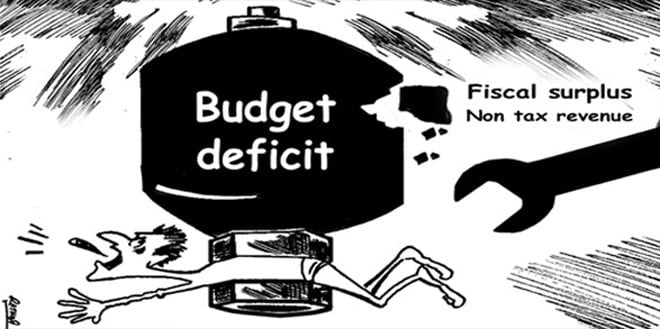

The PML-N government’s forthcoming budget on 3rd June, 2014, will go for its preferred recipe of indirect taxes and raise in electricity prices. It will have two major tax components -- withdrawal of exemptions and expected introduction of new taxes. In its first budget for 2013-14, the Nawaz Sharif government is expected to introduce more than Rs200 billion new taxes.
The target of new taxes is being set in line with the understanding with the IMF. The provinces are also being asked to cut their development budget by 0.8 per cent to bring the budget deficit to 4.8 per cent from 5.7 per cent to get the next tranche of $6.7 billion under the Fund’s Extended Fund Program for Pakistan. Imposition of possible indirect taxes in the new budget is likely to push the living cost upward. The revenue generation for Financial Year 2014-15 is estimated to be Rs2810 billion which is 24 per cent (Rs535 billion) higher than the current year’s revised target of Rs2275 billion.
Downward revision of tax generation revenue to Rs2275 billion against the budgetary target of Rs2475 billion is a manifestation of tax worthy citizens’ mistrust. Simplification of tax regime, prompt refund of sales tax with a focus on growth can be a good choice for better resource mobilisation for running the administration through equitable and simple tax collection machinery. Easily understandable tax system is also an instrument to create investment-friendly environment. Lackluster growth caused by myriad of socio-economic problems has its visible fallout on tax regime.
In Pakistan’s perspectives, removal of loopholes in tax enforcement regime and the exemptions/tax amnesty schemes is essential. These schemes adversely affect the tax compliance. Tax gap also demands capacity building of tax officials and enhancement in their number. Improvement in taxation system may help in provision of a level-playing field for all sectors of economy. There is a need to put in place an effective understanding mechanism between the tax officials and tax payers. Nevertheless, maximum utilisation of tax money for productive purposes and implementation of people-oriented plans can have lasting effects to gain the people’s confidence. Achievement of this objective will encourage people to pay their due share of taxes for national socio-economic development and political stability.
Upward revision of current expenditure during 2013-14 from Rs3.170 trillion to Rs3.198 trillion, downward revision of development budget from Rs540 billion to Rs425 billion, whopping gap of Rs200 billion in revenue generation of Rs2275 billion against budgetary target of Rs2475 billion and similar situation in other heads is indicative of missing the budgetary targets. The Annual Plan Coordination Committee (APCC) in its meeting on 26 May, 2014 has approved Rs525 billion for PSDP projects to be executed during 2014-15.
Reportedly, tax targets for next year are based on a three-pronged strategy i.e. (i) withdrawal of tax exemptions granted through the galore of SROs; (ii) expected increase in the existing tax rates and (iii) widening of tax base. Exemptions through SROs are causing a stunning burden of around Rs480 billion. Rs103.96 billion will be saved during 2014-15 through doing away with exemptions/concession schemes.
New taxation measures in addition to bringing undocumented sector into the tax net/higher rates for non-tax payers is expected to increase the Federal Excise duty rate to 17 per cent. Introduction of new withholding taxes, increase in the existing tax rates and withdrawal of customs exemptions are aimed to enhance government’s revenue.
The question here arises as to whether Federal Board of Revenue (FBR) will simply propose enhancement in existing taxes, imposing new taxes or will initiate measures to plug the weak points in taxation system to improve revenue generation. During 2014-15, economic growth is being projected at 5.5 per cent while the tax-to-DGP ratio is expected to squeeze to 8.8 per cent against budgetary target of 9.9 per cent.
The registration of 61,989 companies in June 2013, mostly in private hands, is reflective of growing wealthy groups. The corporate sector is also blamed for tax avoidance as less than 40 per cent companies filed their tax returns. Tax avoidance practice in corporate sector is an international phenomenon. And its complete eradication is impossible for one or the other reason. Even the wealthy nations with good governance system and strong democracies having inbuilt checks and balance mechanism are also countering tax evasion in the corporate sector. The Organization for Economic Cooperation and Development (OECD) in 2013 had launched the project "Base Erosion, Profit Shifting (BEFS)" to fight against corporate tax avoidance.
Talk of expanding the tax base system would be no more than political rhetoric if the stress on indirect taxes continues. The practice of granting concessions in the name of trade facilitations to enhance investment and growth need to be rationalised. In our case, perhaps introduction of broadened direct tax-based regime can deliver provided it is enforced effectively. Reportedly, the FBR has also forwarded a proposal, on the UK pattern, to the Finance Division to outsource the task to verify the authenticity of file returns through charted accountants submitted by commercial entities to minimise the tax frauds and improve the tax-GDP ratio.
Simple and optimum revenue-generating taxation system encourage public to contribute their due share. Tax system with good recovery manifests (i) transparency in taxation system, (ii) good governance that increases public trust in the political leadership; and (iii) zero-tolerance for corrupt practices. Less taxes but more revenue facilitate growth in economy and help control inflation.